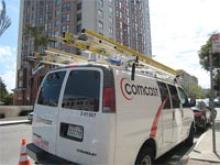Spanish Fork Telephone Benefits Community
Spanish Fork, a well-regarded community broadband network, is now offering triple-play services on its hfc network. Previously, the town was offering broadband and television but recently added telephone after feeling the time was right.
From the article:
John Bowcut, director of Information Systems for Spanish Fork, said 15 percent of homes signed up when told telephone service was available over the cable. The network only used door hangers to advertise at first because it intended to have a slow rollout. Then the service was promoted in the city newsletter. SFCN's phone rollout was slow for a reason. Small neighborhoods were notified one at a time, which allowed the network to handle the load. Bowcut said they didn't want to open sign-ups citywide and then have to tell people their connection date was three months out. He said the most people had to wait this way was 10 days. Initially about 1,500 homes signed up for phone service, out of 5,534 homes in Spanish Fork.The new telephone service runs an economical $14.95 with a variety of features. 75% of the town takes at least one service from the network, perhaps because of the great customer service:
Perrins was a beta tester for the system. He thought going through that process was awesome. They fixed every problem quickly and fine-tuned the network. "It was fun because the employees were so excited and eager to find and fix the problems."Prior to the telephone rollout, only some 60% of the community took a service from the network, as explained in this article
About 60 percent of Spanish Fork residents already subscribe to SFCN's cable TV and high-speed Internet. The customer appeal of the city-run communications utility is that Spanish Fork provides both the infrastructure and the service -- a practice that was actually outlawed by the Utah Legislature in 2004, though Spanish Fork was grandfathered in. This means SFCN can cut out any middle-man service provider, which amounts to about $2 million in savings each year, Mayor Wayne Andersen said. "I think it was a sad day when the state Legislature put the kibosh on that sort of thing," Andersen said.



